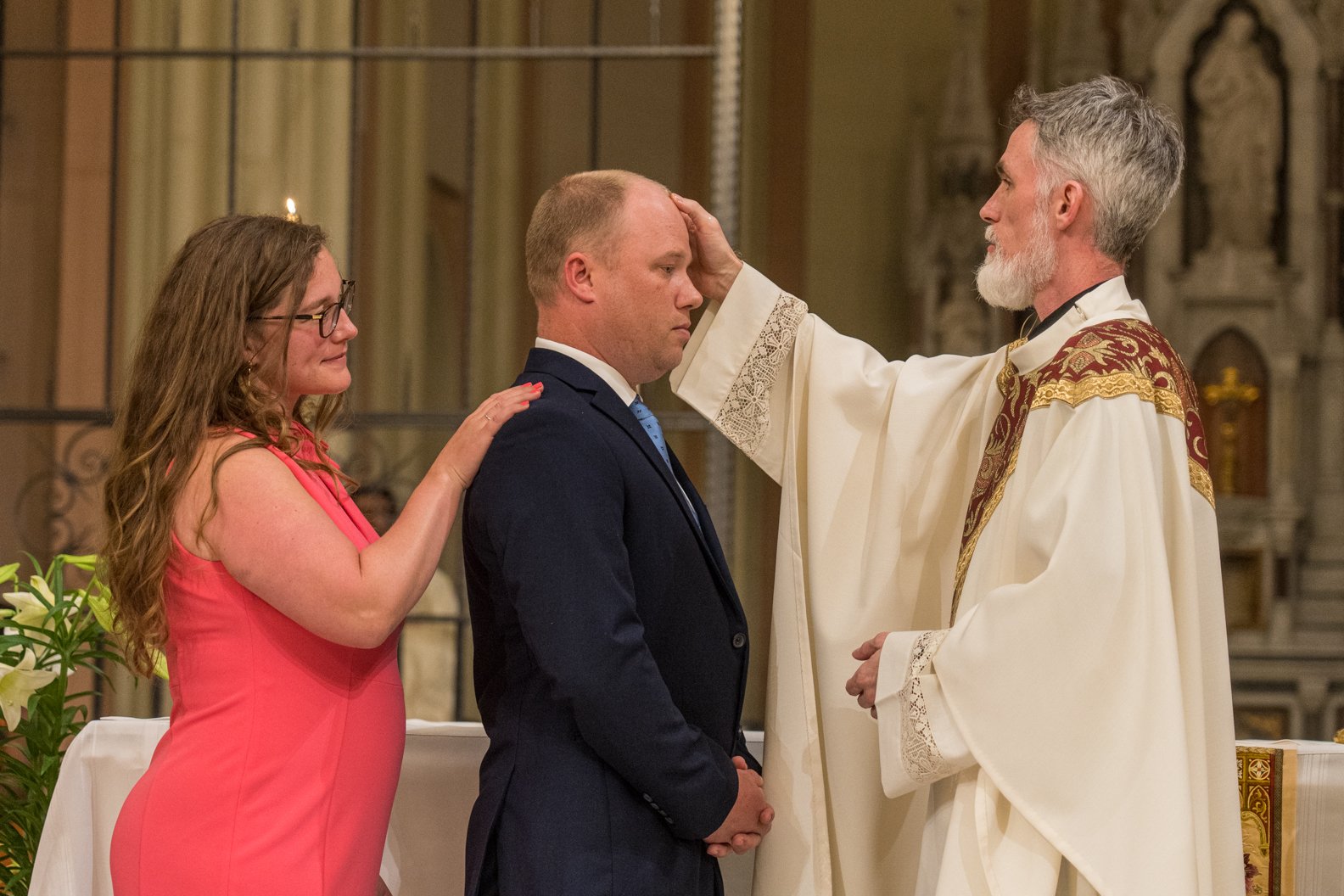Order of Christian Initiation of Adults
Contact - Sara Schulte-Bukowinski sarasb@creighton.edu 402-280-2934
Adults wishing to be baptized, confirmed, or received into full communion with the Catholic Church are invited to participate in our Initiation Ministry program, including RCIA.
What is OCIA ?
OCIA is a journey of faith, a deep conversion to Jesus Christ for those seeking to enter the Christian community through baptism. During this process, a person is formed in faith by reflecting on God’s Word, the Catholic community’s life, liturgy, beliefs, and apostolic works. The OCIA is a total formation process culminating in full membership in the Catholic Church, through the sacraments of initiation: Baptism, Confirmation, and Eucharist.
What if I’m already baptized?
Our Initiation Ministry also welcomes baptized Christians from other denominations who desire full communion in the Catholic Church, as well as adults who were baptized as Catholics but who have not received other sacraments of initiation (Eucharist and/or Confirmation). Baptized candidates walk along with those seeking baptism in a process of formation until they are more deeply incorporated into God’s Word, the Catholic community’s life, liturgy, beliefs and apostolic works. While they may be fully received or Confirmed at the Easter Vigil, this reception into full communion can also happen at other times of the year. This requires ongoing discernment of the candidates with their sponsor and the director of Initiation Ministries.
What does the process look like?
The process of full initiation into the Church has four stages, beginning with the Period of Inquiry. This is a time for questions and finding out more about the Church and its life of faith. Not all inquirers decide to enter the Church or to complete their initiation.
The Period of Catechumenate begins with the Rite of Acceptance (for the unbaptized) and the Rite of Welcome (for those baptized and seeking full communion). After this ritual, those seeking baptism are called catechumens. Those seeking full communion and Confirmation are called candidates. During this period we meet weekly to “Break Open the Word,” which means to reflect and share on the Sunday readings. We also offer reflection about God’s action in our own lives, and we learn more about what it means to be part of the Catholic Church. Sometimes this happens with a presenter sharing on a particular topic. At other times we will invite catechumens and candidates to attend activities of the Church and thus grow into participating members of the community. This is a time of prayer and learning as we seek to deepen our lives of faith lived in community.
Catechumens are asked to live through this formation for a minimum of one full year leading up to the Easter Vigil of their baptism. Candidates, who are already baptized will be in the process for varying amounts of time depending on catechesis they have already experienced and may be received into full communion and Confirmed either at the Easter Vigil or at other suitable times of the year.
The Period of Purification and Enlightenment begins with the first Sunday of Lent. The Rite of Election is celebrated at this time for catechumens, who now become known as “the elect.” This period intensifies the elect’s prayer with scripture, and reflection on their lives in preparation for the sacrament of Baptism. During this time the community prays over the elect in our celebration of the Scrutinies. These prayers focus on our need for liberation from sin, and our trust in God’s loving care.
The Baptism of the Elect takes place at the Easter Vigil. The elect are brought into the body of Christ through baptism and are immediately Confirmed and welcomed at the Eucharistic table. Candidates for full communion or Confirmation may also be received at this time.
The last stage is the Mystagogia. This period is like the “afterglow” once sacraments have been received. The newly baptized, now called neophytes, and those newly Confirmed and received at the Eucharistic table, gather together to pray over the graces received. This is a time to share the fruits of God’s work in our lives. This is, of course a lifelong process, but we share intentionally these first weeks or months as we notice God’s grace deeply.
How long does it take?
Catechumens are invited to walk this journey for a minimum of one full year. That means a catechumen may end up being in process for more than a year depending on when they begin the journey. For baptized candidates, the length of time in the process will vary. This depends on their prior formation and current discernment. A life of faith is not about graduating and there is no “accelerated program” because this is the work of friendship with God in our lives. This is a process, not a program, and it takes the time it takes to prepare for the sacramental graces God longs to share in our lives.








